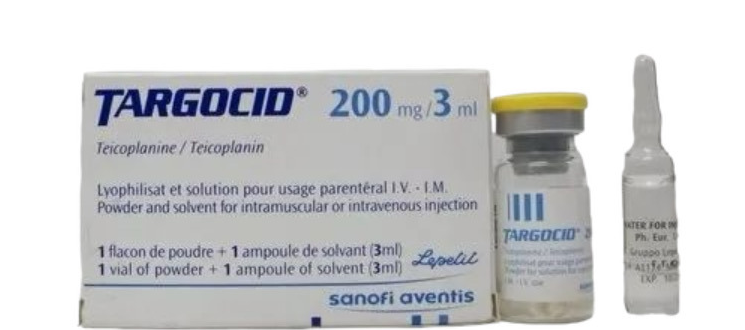Targocid 200 mg
Product Details
Targocid, 200 mg, powder and solvent for solution
Description
Targocide is an antibiotic. It contains an active substance called teicoplanin. Targocide is used to treat bacterial infections.
Composition
The active ingredient of the drug is teicoplanin.
Each vial contains 200 mg of teicoplanin, which corresponds to at least 200,000 IU.
after dissolving the powder, the solution will contain 200 mg of teicoplanin in 3.0 ml.
Excipients: powder for the preparation of an injection/infusion solution or oral solution: sodium chloride; sodium hydroxide (for pH adjustment). Solvent: water for injection.
Dosage
This medicine should always be used exactly according to the doctor's recommendations. If in doubt, contact your doctor or pharmacist.
Action
Teicoplanin is a broad-spectrum antibiotic. The drug has found its application in the treatment of infections caused by gram-positive bacteria. The drug has a bactericidal effect on bacteria that provoke infection in the patient's body.
Indications
Targocid is indicated for use in adults and children (including newborns) for the treatment of bacterial infections: skin and subcutaneous tissue (sometimes called soft tissue infections); joints and bones; lungs; urinary tract; heart (sometimes called endocarditis); abdominal cavity; peritonitis; blood.
Targocid is also indicated as an alternative oral treatment for diarrhea and intestinal inflammation of grube associated with Clostridium difficile infection.
Contraindications
Do not use the drug in case of hypersensitivity to the active substance or any component of the drug.
Side effects
Like any medicine, this medicine can cause side effects, although not everyone has them.
Side effects that occur infrequently (may occur no more often than 1 in 100 patients): sudden life–threatening allergic reaction - symptoms may include: shortness of breath or wheezing, swelling, rash, itching, fever, chills.
Side effects that occur rarely (they may occur no more often than in 1 in 1,000 patients): redness of the upper body.
Additional information is provided in the booklet attached to the drug.
Warnings and precautions
Tell your doctor if you are: allergic to an antibiotic called vancomycin; has redness of the upper body (red man syndrome); has a low platelet count (thrombocytopenia); has kidney failure; takes other medications that may cause hearing impairment and/or kidney failure.
The patient may have regular checkups to see if the kidneys and/or liver are functioning.
Use of other medicines
Tell your doctor about all the medications you are currently taking, recently, or if you have recently received any vaccine, as well as the medications you plan to take, including those that are available without a prescription.
Information is especially important if you are taking: aminoglycosides; Amphotericin B (a drug that is used to treat fungal infections); cyclosporine (a drug that affects the immune system); cisplatin (a drug that is used to treat malignant tumors); diuretics (for example, furosemide).
Pregnancy and breast-feeding
If you are pregnant or breastfeeding, assume that she may be pregnant, or when she plans to have a baby, she should consult a doctor or pharmacist before using this medicine.
The decision on the use of the drug during pregnancy and lactation is made by a doctor.
The use of the drug in children and adolescents
The decision on the use of the drug in children is made by a doctor.
Manufacturer
Sanofi Winthrop Industrie
82, Avenue Raspail
94250 France
Display prices in:EUR

